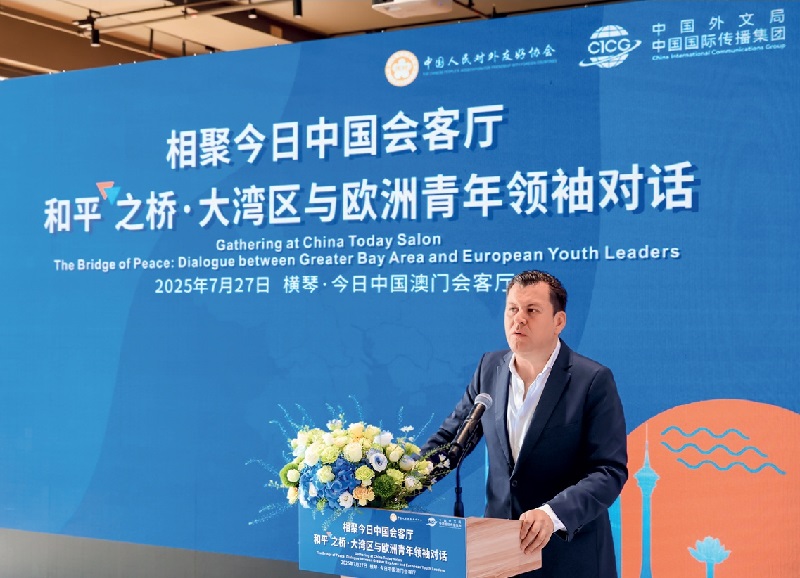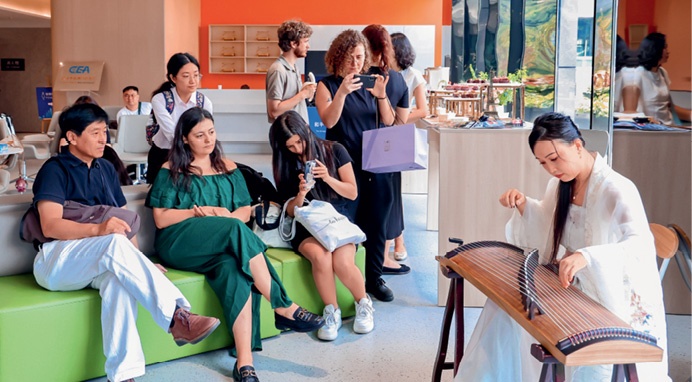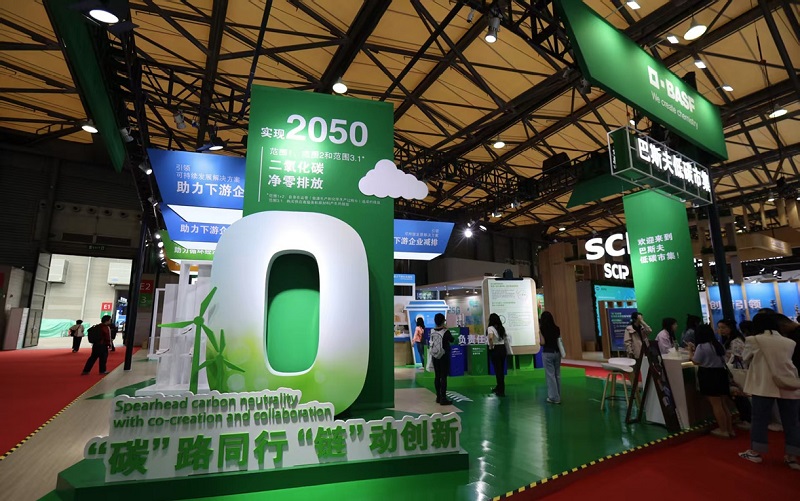“As a global citizen, I speak to you with fear. I fear increasing unpredictability and fragmentation that can easily result in conflict. And in conflict, no one wins – we all lose,” Matias Acosta, CEO of Italian cleantech firm Cosysense, told the audience at the China Today • Macao Salon dialogue in Hengqin, south China’s Guangdong Province, on July 27, 2025.
His words resonated among dozens of youth leaders from the Guangdong-Hong Kong-Macao Greater Bay Area (GBA) and Europe, who gathered for “The Bridge of Peace” event – a prelude to the World Youth Conference for Peace. Their mission is to harness technology and work toward the theme “Lasting Peace by Youth, Brighter Future via Innovation.”

Jacobo García, president of Global Youth Leadership Forum, speaks at China Today • Macao Salon in Hengqin, Guangdong Province on July 27, 2025.
 For the Common Good
For the Common GoodAcosta’s conviction stems from family history. His great-grandparents fled famine in Europe during World War I, meeting and marrying aboard a ship bound for Argentina.
“Yet I remain hopeful,” Acosta declared in his speech. “Science and innovation can be more than engines of prosperity; they can serve as diplomatic tools – building bridges where politics may struggle.”
A visit to Sun Yat-sen’s former residence in Zhongshan City during their GBA tour left Acosta reflecting on Sun’s inscription, “tian xia wei gong” (the world belongs to all). This philosophy powerfully echoes his own commitment to serving the common good – a principle he actively applies in leading his company, Cosysense.
Cosysense is developing cleantech that uses AI and sensors to optimize building temperatures, targeting a critical inefficiency: heating/cooling consumes about 40 percent of global energy, while thermal discomfort wastes around 15 percent of utility costs.
“We created a plug-and-play climate control for air conditioners that integrates quantified human comfort into dynamic, intelligent control,” Acosta explained. Operating as an impact company, Cosysense employs a unique business model. “Clients receive our system for free. They only pay a fraction of their achieved savings. No savings means no fee,” he said.
Acosta’s message at the China Today • Macao Salon event echoed Chinese People’s Association for Friendship with Foreign Countries (CPAFFC) President Yang Wanming’s call for enhanced dialogue between Chinese and European civilizations. In his video address, Yang urged youth from both sides to strive for the common good and pursue enduring progress. “I hope you will always cherish the spirit of sharing one planet and supporting one another, remain open and inclusive, and work with great enthusiasm to build a community with a shared future for humanity.”

On the sidelines of the “Gathering at China Today Salon – The Bridge of Peace: Dialogue Between Greater Bay Area and European Youth Leaders” event in Hengqin, Guangdong Province, attendees are captivated by a guqin performance on July 27.
Huge Potential for China-EU Cooperation
In a video speech at the event, co-sponsored by CPAFFC and China International Communications Group (CICG), Du Zhanyuan, president of CICG, called on young entrepreneurs from China and Europe to focus their efforts on enhancing human well-being and advancing exchanges among civilizations. He urged them to harness their ingenuity to become innovators in business practices, pioneers of technological frontiers, and bridge-builders for cross-cultural exchange.
Du also emphasized the need for these youth leaders to address global challenges, including peace and security, sustainable development, and environmental protection.
Stephan Katzgraber, an Austrian entrepreneur, exemplifies this kind of innovator, pioneer, and bridge-builder. His company, KPA Recycling Solutions GmbH, designs and implements advanced recycling solutions for clients across Europe, South America, and Africa. KPA specializes in providing tailored recycling solutions – including industrial machinery, comprehensive consulting, and implementation services – for the B2B sector and governmental institutions.
Global recycling efforts, however, remain out of sync. While Europe has significantly increased its municipal waste recycling rate over the past two decades, with countries like Germany recycling over 60 percent, challenges persist, particularly with plastic and electronic waste. The EU aims to recycle 65 percent of municipal waste and 70 percent of packaging waste by 2035.
In contrast, South America faces distinct structural hurdles. Despite expanding efforts, overall recycling rates remain below 10 percent in many countries. Peru, for example, recycles only about 4-6 percent of its solid waste, lacking sufficient infrastructure and government support.
“This gap presents both a challenge and an opportunity,” Katzgraber said at the event. “That’s precisely where KPA steps in: delivering European technology and standards to underserved regions, helping local industries scale efficiently and sustainably.”
Katzgraber sees China, a global manufacturing leader and key innovator in recycling technology, especially in plastic sorting, e-waste processing, and AI-based robotics, as a crucial EU partner. He outlined potential cooperation modes, including joint R&D projects to upgrade secondhand equipment for emerging markets, pilot programs in regions like Africa or Latin America, which combine Chinese production efficiency with European standards for accelerated impact, and platforms for knowledge exchange.
“We’re already exploring partnerships with suppliers in Shenzhen and Jiangsu to integrate Chinese-made sensor arrays into our AI monitoring systems,” Katzgraber told the audience. “Imagine: Austrian design, Chinese electronics, Peruvian infrastructure –a truly global approach to implementing the circular economy,” he enthused.
Reflecting on his experience, Acosta noted, “China humbled me on this trip. In just a few days, you revealed world-leading technology and infrastructure alongside a civilization deeply rooted in millennia of tradition.” He stressed that China and Europe need deeper mutual understanding to foster collaboration, calling this trip a significant contribution to that vision. “EU-China collaboration can and should be a global model, demonstrating how we can embrace our differences to create synergy,” Acosta asserted.

At the BASF exhibition booth during the 2024 Shanghai International Carbon Neutrality Expo, new materials for low-carbon technologies and solutions, as well as products made from these new materials, are displayed on June 7, 2024.
Openness for Common Development
In September 2021, the Guangdong-Macao In-Depth Cooperation Zone in Hengqin was officially established, pioneering a new system of “joint deliberation, co-construction, co-management, and shared benefits” between Guangdong and Macao. By 2024, Hengqin’s regional GDP had surged to RMB 53.848 billion, a staggering 187.9-fold increase from its RMB 285-million level in 2009.
Speaking at the event, Li Chong, deputy director of the cooperation zone, emphasized its role as a frontline hub for China’s reform and opening-up. He highlighted how the nation is actively cultivating the “Macao + Hengqin” model as a new platform for high-level opening-up. Li detailed the attractive environment in Hengqin, including a “dual 15-percent” tax incentive (corporate and personal income tax) for eligible entities, efficient cross-border financial innovation management, highly streamlined market access, and secure and orderly cross-border data flows.
Lao Ngai Leong, member of the Executive Council of Macao, noted that since Macao’s return to China over two decades ago, it has achieved rapid economic growth, continuous improvements in livelihoods, and rising global prominence, entering its best historical development phase. He highlighted Macao’s 2024 per capita GDP ranking second globally and first in Asia (surpassed only by Luxembourg), according to Forbes.
“Today, bolstered by strong support from Hengqin, Macao has seen emerging industries, including MICE commerce, specialized finance, high-tech R&D, and traditional Chinese medicine, gain significant prominence,” Lao stated. He added that more Macao residents are pursuing careers and ventures in Hengqin, while international enterprises increasingly operate synergistically across both regions, leveraging Macao’s global access platform and Hengqin’s gateway to China’s vast domestic market.
Lao Chi Long, a Macao young entrepreneur doing business in Hengqin for 11 years, shared his journey of integrating into the mainland with national support. “When I first arrived, Hengqin was desolate, a stark contrast to Macao’s bustle. Now, transformed by national support, it’s a modern area with high-rises everywhere. As Hengqin grew, so did my career. Starting a business here is about seizing era-defining opportunities,” he said. He sees Macao playing a unique role in the Belt and Road Initiative, utilizing its location and culture to connect China with Portuguese-speaking and ASEAN countries.
Hong Kong entrepreneur Lam Kwong believes a company’s growth should align with the nation’s development path. In 2020, he launched Hengqin’s first food-themed incubation center to help Hong Kong and Macao brands grow in the mainland market. “Setting up here didn’t just lower costs; it opened new doors,” Lam said. His venture also helps mainland products enter Hong Kong and Macao markets, creating two-way value and stronger connections.
For entrepreneurs like Lam and Lao, the mainland represents a broader stage “where dreams accelerate and ideas grow.” They aspire to build bridges together with European youth leaders, connecting cities, cultures, and peoples across the globe.
Bridge of Peace
Amidst today’s turbulence-transformation nexus, humanity stands at a pivotal crossroads for peace and development. When youth worldwide embrace ideals and responsibility, they become an inexhaustible force for driving human progress – a truth vividly demonstrated at the World Youth Conference for Peace convened in Beijing on July 29.
Marking the 80th anniversary of the victory in the Chinese People’s War of Resistance against Japanese Aggression and the World Anti-Fascist War, CPAFFC and the All-China Youth Federation gathered 3,000-plus youth delegates, representing over 130 countries and regions across five continents, at Peking University. Under the theme, “Harmony and Coexistence: Together for Peace,” participants explored the role of young people in safeguarding global stability and co-envisioned a future of shared humanity.
In a congratulatory letter to the conference, President Xi Jinping declared, “The future of peace lies with the youth.” He urged young leaders to exchange ideas, deepen mutual understanding, forge friendships, and act as advocates for peace and architects of development, contributing wisdom to build a community with a shared future for humanity.
Ahead of the conference, global youth delegations visited a dozen Chinese provinces, autonomous regions and municipalities, engaging in thematic activities spanning history, culture, economy, technology, and ecology. These on-site experiences showcased the multidimensional achievements of Chinese modernization. Among them, the European youth delegation arrived in the Greater Bay Area to explore its pioneering practices in innovation and development.
Jacobo García, president of the Global Youth Leadership Forum, who headed the European delegation, noted, “The GBA’s fusion of tradition and technological prowess reshapes our understanding of China-Europe relations. To tackle shared challenges, from climate change to resource scarcity, we must leverage technological revolution, economic synergy, and global cooperation.” He specifically advocated expanding exchanges in education, talent cultivation, and cross-cultural entrepreneurship.
Hungarian tech firm Voovo’s co-founder Benedek Szilagyi exemplified this ethos. At the China Today • Macao Salon, he detailed his AI-driven venture empowering students and startups, “We mentor business founders to test ideas and scale products; we help enterprises automate systems using AI.” Szilagyi said, “Standing here, I represent students, entrepreneurs, and professionals across Hungary, ready to collaborate with our Chinese partners.”
This commitment is underscored by Hungary’s status as home to Chinese automaker BYD’s largest electric vehicle factory in Europe.
Szilagyi emphasized that building lasting partnerships requires a focus on shared foundations. He highlighted the importance of expanded student exchange programs and advocated for stronger China-EU cooperation in innovation and entrepreneurship.